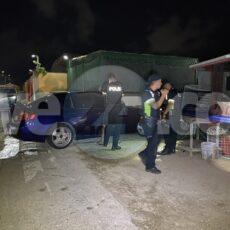
Willemstad – Un persona ku a ser kondená pa bida largu dor di tabata kómplise den kaso di
sekuestro, violashon i asesinato ta rekobrá su libertat kondishonal despues di alrededor di 38
aña, paso un ehekushon adishonal di kastigu di prison ya no tin niun propósito rasonabel mas.
Dia 1 di yüni 2015 e artíkulo 1:30 di Kódigo Penal a drenta na vigor na Sint Maarten. E artíkulo
aki ta enserá ku un persona ku a ser kondená pa bida largu despues di bintisinku aña será, por
rekobrá su libertat kondishonal, si Korte ta di opinion ku un ehekushon adishonal ya no tin niun
propósito rasonabel mas. Pa por tuma un desishon tokante esaki, Korte ta tuma en todo kaso e
posishon di famianan di e víktima den konsiderashon i e peliger ku e kondenado ainda por
kometé un akto kastigabel atrobe.
Na 1985 e persona a ser kondená pa bida largu dor di tabata kómplise di privashon di libertat,
violashon i asesinato. E víktima tabata un mucha muhé di 6 aña di edat. E tempu ei Korte a
konsiderá ku for di raportnan di ekspertonan por a tuma nota ku e kondenado no tin ningun
klase di konsenshi i Korte a konsiderá ku e chèns pa un ripitishon tabata grandi. Na momentu ku
a dikta sentensia a tene na konsiderashon ku mester ta na konosimiento públiko ku e guia
profeshonal i sikiátriko na prison di Kòrsou no tabata sufisiente pa sigurá ku e chèns pa un
ripitishon di e kondenado por ser tresé na un mínimo akseptabel. Pa e motibu aki a skohe e
momentu ei pa un periodo di detenshon mas largu posibel: kastigu di bida largu.
E prosedura ku a kuminsá pa evaluá si e kondenado por rekobrá su libertat kondishonal, a start
na 2018, ku ta tres aña muchu lat. E prosedura di evaluashon a dura na tur kasi kuater aña. Den
e periodo aki diferente eksperto, di kual un sikiatra i un sikólogo, a raportá tokante e kondenado.
E ekspertonan aki ta konsiderá ku e chèns ku e kondenado lo kometé aktonan kastigabel ta abou
i e pronóstiko riba un regreso eksitoso den e komunidat di su pais natal Anguilla, ta ser –
unánimamente – konsiderá positivo.
Aktualmente Korte ta konsiderá ku e chèns ku e kondenado, despues di a rekobrá su libertat, lo
kometé aktonan kastigabel atrobe a baha di tal forma ku e protekshon di e sosiedat kontra e chèns
ei ya no mester ta primordial. Korte a konsiderá e posishon di e famianan i a skuchanan ku
koutela i ku masha atenshon nan deskripshon di e sufrimentu indiskutibel ku nan a pasa aden
dor di e delitonan ku e kondenado a kometé ku e víktima i e tristesa ku nan ta eksperensiá tur
dia ainda. E famianan a ekspresá ku de fakto nunka nan lo akseptá e libertat di e kondenado i
nan ta oponé firmemente kontra di esaki.
Maske ku e deklarashonnan di e famianan ta di importansia na momentu ku konsiderá si e
kondenado por rekobrá su libertat kondishonal, Korte no a atribuí importansia desisivo na esaki.
Al fin al kabo, e punto di salida ta ku despues di 25 aña di kastigu di bida largu, e sentensia mester
ser revisá. Esaki ta paso e ehekushon di un kastigu di bida largu sin ningun speransa pa por
regresá den komunidat por krea un situashon degradante. Sin pèrdè for di bista e gravedat di e
aktonan ku a ser kometé e tempu ei i e sufrimentu ku a keda kousá pa semper, e aspekto ku e
famianan ta deseá ku e kondenado nunka por sali liber, no por ta un motibu awor pa depriva e
kondenado, ku a keda será pa un periodo asina largu di kasi 40 aña, ku e perspektiva faborabel
pa drenta bèk den komunidat i tambe ku un riesgo hopi abou di por kometé un otro echo
kastigabel, di rekobrá su libertat kondishonal.
Tambe Korte ta husga ku aktualmente e kastigu di prisòn no tin un meta rasonabel mas i ku pa
dia 1 di yüli 2022 e kondenado mester keda poné den libertat, ku e kondishon general ku e
kondenado no por kometé ningun akto kastigabel pa restu di su bida, sino e kastigu di bida largu
lo por rebibá. Korte ta konfia ku e promesa di Ministerio Públiko, ku e kondenado lo keda sostené
mas tantu ku ta posibel dor di outoridatnan di Anguilla na momentu ku e drenta bèk den e
komunidat ei, lo ser kumplí. Dia 1 di yüli 2022 e kondenado lo ser deportá pa Anguilla.
Willemstad – Tot levenslang veroordeelde voor het medeplegen van ontvoering, verkrachting
en moord wordt na ruim 38 jaar voorwaardelijk in vrijheid gesteld door het Hof, omdat een
verdere tenuitvoerlegging van de gevangenisstraf thans geen redelijk doel meer dient.
In Sint Maarten is op 1 juni 2015 artikel 1:30 van het Wetboek van Strafrecht in werking getreden.
Dit artikel houdt in dat een tot levenslang gestrafte na vijfentwintig jaar vrijheidsbeneming
voorwaardelijk in vrijheid kan worden gesteld, als het Hof van oordeel is dat een verdere
tenuitvoerlegging geen redelijk doel meer dient. Om hierover een beslissing te kunnen nemen,
neemt het Hof in ieder geval in beschouwing de positie van de nabestaanden van het slachtoffer
en het gevaar dat de veroordeelde alsnog zal recidiveren.
In 1985 is de veroordeelde tot een levenslange gevangenisstraf veroordeeld wegens het
medeplegen van wederrechtelijke vrijheidsberoving, verkrachting en moord. Het slachtoffer was
een meisje van 6 jaar oud. Het Hof overwoog toen dat uit de rapporten van de deskundigen bleek
dat bij de veroordeelde geen sprake was enige gewetensvorming en het Hof achtte de kans op
herhaling aanzienlijk. Bij de strafoplegging is toen meegewogen dat het van algemene
bekendheid moest worden geacht dat de deskundige en psychiatrische begeleiding in de
strafgevangenis van Curaçao onvoldoende was om te kunnen bewerkstelligen dat de kans op
herhaling bij de veroordeelde werd teruggebracht naar een aanvaardbaar minimum. Om die
reden is toen gekozen voor de langst mogelijke detentieperiode: levenslang.
De procedure die is gestart om te beoordelen of de veroordeelde voorwaardelijk in vrijheid kan
worden gesteld, is in 2018, drie jaren te laat, gestart. De toetsingsprocedure heeft in totaal bijna
vier jaar geduurd. In deze periode hebben diverse deskundigen, waaronder een psychiater en
een psycholoog, over de veroordeelde gerapporteerd. Deze deskundigen achten de kans dat de
veroordeelde in de toekomst nieuwe strafbare feiten zal plegen laag en de prognose op een
succesvolle terugkeer in de samenleving van zijn land van herkomst, Anguilla, wordt door hen –
unaniem – goed genoemd.
Het Hof overweegt thans dat de kans dat de veroordeelde, na vrijlating, wederom strafbare feiten
zal plegen zodanig is verminderd dat de bescherming van de samenleving tegen die kans niet
meer voorop moet staan. Het Hof heeft in ogenschouw genomen de positie van de nabestaanden
en met zorg en nauwlettend geluisterd naar hun beschrijving van het ontegenzeggelijke leed dat
hen is aangedaan met de delicten die de veroordeelde jegens het slachtoffer heeft gepleegd en het
verdriet dat zij nog steeds elke dag ervaren.
De nabestaanden hebben kenbaar gemaakt dat zij de vrijlating van de veroordeelde de facto nooit
zullen accepteren en verzetten zich daar met klem tegen. Hoewel de verklaringen van de
nabestaanden van betekenis zijn bij de afweging of de veroordeelde voorwaardelijk in vrijheid
kan worden gesteld, heeft het Hof hieraan geen doorslaggevende betekenis toegekend. Als
uitgangspunt heeft immers te gelden dat na ommekomst van 25 jaren van een levenslange
gevangenisstraf dient te worden getoetst. Dit omdat de executie van een levenslange
gevangenisstraf zonder enige hoop op terugkeer in de maatschappij een mensonterende situatie
kan opleveren. Zonder afbreuk te willen doen aan de ernst van de destijds gepleegde feiten en
het leed dat daardoor blijvend is veroorzaakt, kan het aspect dat de nabestaanden wensen dat de
veroordeelde nooit in vrijheid wordt gelaten, thans geen reden zijn om de veroordeelde na zo’n
lange detentieperiode van bijna 40 jaren met het genoemde gunstige vooruitzicht op terugkeer in
de maatschappij en het lage recidiverisico niet voorwaardelijk in vrijheid te stellen.
Het Hof oordeelt dan ook dat de gevangenisstraf thans geen redelijk doel meer dient en dat de
veroordeelde per 1 juli 2022 in vrijheid dient te worden gesteld, onder het opleggen van de
algemene voorwaarde dat de veroordeelde gedurende de rest van zijn leven geen strafbare feiten
mag plegen, anders kan de levenslange gevangenisstraf herleven. Het Hof vertrouwt erop dat de
toezegging van het openbaar ministerie dat de veroordeelde zoveel als mogelijk zal worden
ondersteund door de autoriteiten van Anguilla bij zijn terugkeer in de maatschappij zal worden
nageleefd. De veroordeelde zal per 1 juli 2022 worden uitgezet naar Anguilla.
April 6, 2022
PRESS RELEASE
Willemstad – Sentenced to life imprisonment for co-conspiracy of kidnapping, rape and
murder will be released on parole by the Court after more than 38 years, because a further
execution of the prison sentence is now no longer serving a reasonable purpose.
In St. Maarten, Article 1:30 of the Criminal Code entered into force on June 1, 2015. This article
indicates that a person sentenced to life imprisonment may be released on parole after twentyfive years of incarceration, if the Court is of the opinion that a further execution no longer serves
a reasonable purpose. In order to be able to take a decision on this, the Court will in any case take
into consideration the position of the victim’s relatives and the risk that the convicted person will
reoffend.
In 1985, the convicted person was sentenced to life imprisonment for co-conspiracy of unlawful
deprivation of liberty, rape and murder. The victim was a 6-year-old girl. The Court then
considered that it appeared from the experts’ reports that the convicted person did not show any
signs of conscience and the Court considered that there was a substantial chance of repetition. At
the time of sentencing, it was taken into account that it must be considered of general knowledge
that the expert and psychiatric counseling in the prison of Curaçao was insufficient to reduce the
risk of repetition to an acceptable minimum. For that reason, the longest possible detention period
was chosen: life imprisonment.
The procedure to assess whether the convicted person can be released on parole was started in
2018, three years too late. The assessment procedure took almost four years in total. During this
period, various experts, including a psychiatrist and a psychologist, reported on the convicted
person. These experts consider the chance that the convicted person will commit new offenses in
the future low and the prognosis of a successful return to the society of his country of origin,
Anguilla, – unanimously – good.
The Court now considers that the chance that the convicted person, after being released, will
commit criminal offenses again has diminished to such an extent that the protection of society
against that chance should no longer be a priority. The Court considered the position of the
relatives and has listened with care and close attention to their description of the undeniable
suffering caused to them by the offenses committed by the convict against the victim and the grief
they still experience every day. The relatives have expressed that they will de facto never accept
the release of the convicted person and strongly oppose it.
Although the statements of the relatives are of importance when considering whether the
convicted person can be released on parole, the Court did not attribute any decisive significance
to this. After all, the starting point is that after 25 years of life sentence, the sentence should be
reviewed. This is because the execution of a life sentence without any hope of re-integration into
society can lead to a degrading situation. Without wishing to detract from the seriousness of the
acts committed at the time and the suffering they have permanently caused, the aspect that the
relatives wish the convicted person never to be released cannot now be a reason for not granting
release on parole after such a long period of imprisonment of almost 40 years with the
aforementioned favorable prospect of a return to society and the low risk of recidivism.
Therefore, the Court finds that imprisonment now no longer serves a reasonable purpose and
that the convicted person should be released as of July 1, 2022, subject to the general condition
that the convicted person may not commit any criminal offenses for the rest of his life, otherwise
the life sentence may be revived. The Court trusts that the promise of the Public Prosecution
Service that the convicted person will be supported as much as possible by the authorities of
Anguilla upon his return to society, will be respected. The convicted person will be deported to
Anguilla as of July 1, 2022.















